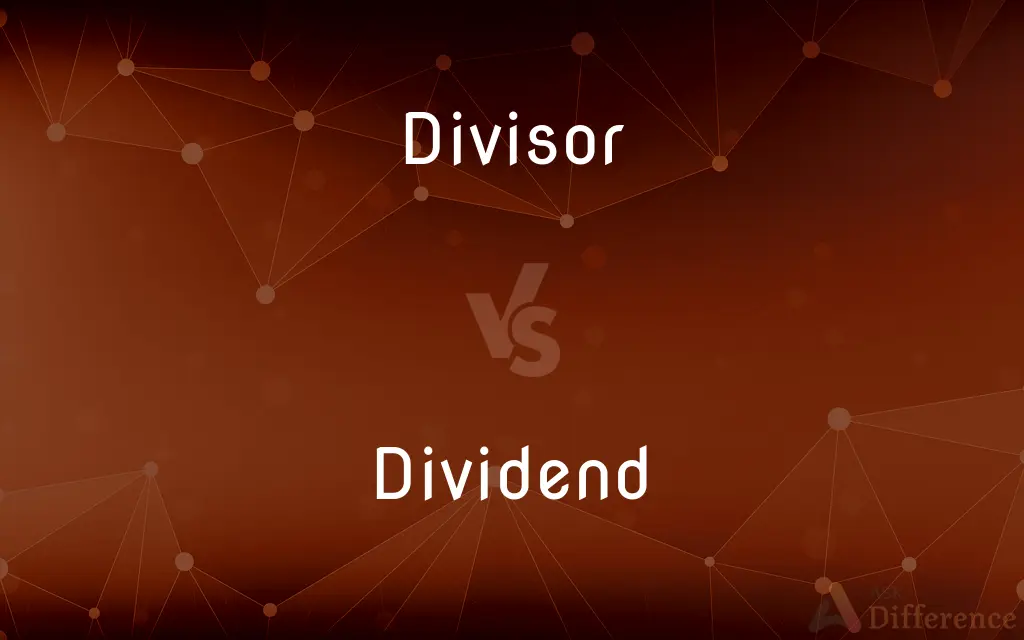Divisor vs. Dividend — What's the Difference?
By Tayyaba Rehman — Updated on October 5, 2023
Divisor is the number by which another number is divided. Dividend is the number being divided in a division operation.

Difference Between Divisor and Dividend
Table of Contents
ADVERTISEMENT
Key Differences
A Divisor, in mathematical terms, represents the number by which another number is divided. Meanwhile, a Dividend signifies the number which is to be divided by the divisor. Both elements are crucial to successfully executing and understanding a division operation.
Generally, when discussing the division, the Divisor is showcased as the number outside the division bracket, or the number beneath the division line in fraction notation. The Dividend tends to be the number inside the bracket or above the division line, demonstrating the value to be divided.
It is essential to comprehend the roles of both the Divisor and the Dividend in mathematics to accurately interpret division problems and properly determine the quotient (the result of division). Notably, the dividend is always the number being split into equal parts.
The Divisor is foundational in a division equation, as it determines how many equal parts the dividend will be divided into. Without the divisor, it's impossible to ascertain how the dividend is to be separated and, as a result, determine the outcome of the division.
Reflecting on investments, the term Dividend acquires a different implication, referring to a payment made by a corporation to its shareholders. However, in this financial context, the term Divisor is not utilized or juxtaposed with Dividend, underscoring their distinct applications.
ADVERTISEMENT
Comparison Chart
Role in Division
Number by which division is performed
Number being divided
Position in Operation
Below or outside the division symbol
Above or inside the division symbol
Financial Context
Not commonly used
A payout to shareholders
Role Determination
Determines how many parts the dividend is divided into
The number that is divided into parts
Outcome Impact
Influences the size of each part in the result
Becomes smaller or larger parts based on the divisor
Compare with Definitions
Divisor
Number performing division
The divisor 2 divides 6 into 3 parts.
Dividend
Basis for quotient calculation
18 becomes a dividend when divided by 6 to get 3.
Divisor
Separator of a number
Using 4 as a divisor, 20 is partitioned into 5s.
Dividend
Sum to be divided
The dividend 25 divided by 5 yields a quotient of 5.
Divisor
Partitioner of a dividend
With 7 as the divisor, 49 is separated into sevens.
Dividend
Number being divided
The dividend 10, when divided by 2, gives 5.
Divisor
Factor of division
A divisor of 5 ensures 15 is split into three 5s.
Dividend
Quantitative subject of division
A dividend of 15 divided by 3 equals 5.
Divisor
Element dividing another
A divisor of 3 divides 9 into three equal parts.
Dividend
A dividend is a distribution of profits by a corporation to its shareholders. When a corporation earns a profit or surplus, it is able to pay a proportion of the profit as a dividend to shareholders.
Divisor
In mathematics, a divisor of an integer n {\displaystyle n} , also called a factor of n {\displaystyle n} , is an integer m {\displaystyle m} that may be multiplied by some integer to produce n {\displaystyle n} . In this case, one also says that n {\displaystyle n} is a multiple of m .
Dividend
(Mathematics) A quantity to be divided.
Divisor
The quantity by which another quantity, the dividend, is to be divided.
Dividend
A share of profits paid to a stockholder or to a policyholder in a mutual insurance society.
Divisor
(arithmetic) A number or expression that another is to be divided by.
In "42 ÷ 3" the divisor is the 3.
Dividend
A payment pro rata to a creditor of a person adjudged bankrupt.
Divisor
An integer that divides another integer an integral number of times.
The positive divisors of 6 are 1, 2, 3 and 6.
Dividend
A share of a surplus; a bonus.
Divisor
The number by which the dividend is divided.
Dividend
An unexpected gain, benefit, or advantage.
Divisor
One of two or more integers that can be exactly divided into another integer;
What are the 4 factors of 6?
Dividend
(finance) A cash payment of money by a company to its shareholders, usually made periodically (e.g., quarterly or annually).
Divisor
The number by which a dividend is divided
Dividend
(arithmetic) A number or expression that is to be divided by another.
In "42 ÷ 3" the dividend is the 42.
Dividend
(figuratively) Beneficial results from a metaphorical investment (of time, effort, etc.)
His 10,000 hours of practice and recitals eventually paid dividends when he become first-chair violinist.
Dividend
To pay out a dividend.
Dividend
A sum of money to be divided and distributed; the share of a sum divided that falls to each individual; a distribute sum, share, or percentage; - applied to the profits as appropriated among shareholders, and to assets as apportioned among creditors; as, the dividend of a bank, a railway corporation, or a bankrupt estate.
Dividend
A number or quantity which is to be divided.
Dividend
That part of the earnings of a corporation that is distributed to its shareholders; usually paid quarterly
Dividend
A number to be divided by another number
Dividend
A bonus; something extra (especially a share of a surplus)
Dividend
Value being separated
Dividing the dividend 21 by 7 results in 3.
Common Curiosities
Does Dividend also refer to a financial term?
Yes, in finance, a Dividend is a payment made by a corporation to shareholders.
Is the Divisor positioned under the division line?
Typically, yes, the Divisor is often placed beneath the division line.
Is Dividend the number being divided?
Yes, Dividend is the number that is divided by the divisor.
Can a Divisor be zero?
Mathematically, a number cannot be divided by zero, as it is undefined.
What does Divisor represent?
Divisor is the number by which the dividend is divided.
Is the Dividend affected by the Divisor’s value?
Yes, the Dividend is divided into parts, the size of which is determined by the Divisor.
In division, does the Dividend denote the total being split?
Yes, the Dividend is the total number that is divided into equal parts.
Is Dividend always a number in mathematical division?
Yes, in mathematical terms, the Dividend is always the number being divided.
Does the Dividend’s size affect the quotient?
Yes, a larger Dividend, with a consistent Divisor, will result in a larger quotient.
Can Divisor be a fraction?
Yes, a Divisor can be a whole number or a fraction.
In investments, does Divisor refer to shareholder payouts?
No, that financial meaning applies to Dividend, not Divisor.
Is the Divisor important for determining the quotient?
Yes, the Divisor impacts how the Dividend is partitioned, affecting the quotient.
Can a negative number act as a Divisor?
Yes, a negative number can be a Divisor, impacting the sign of the quotient.
What happens if the Divisor is larger than the Dividend?
If the Divisor is larger, the quotient will be a fraction or decimal less than 1.
Does a Divisor influence the dividend in finance?
No, in finance, Divisor doesn't have an established meaning related to Dividend.
Share Your Discovery

Previous Comparison
Pillage vs. Plunder
Next Comparison
Tuck vs. TackAuthor Spotlight
Written by
Tayyaba RehmanTayyaba Rehman is a distinguished writer, currently serving as a primary contributor to askdifference.com. As a researcher in semantics and etymology, Tayyaba's passion for the complexity of languages and their distinctions has found a perfect home on the platform. Tayyaba delves into the intricacies of language, distinguishing between commonly confused words and phrases, thereby providing clarity for readers worldwide.














































